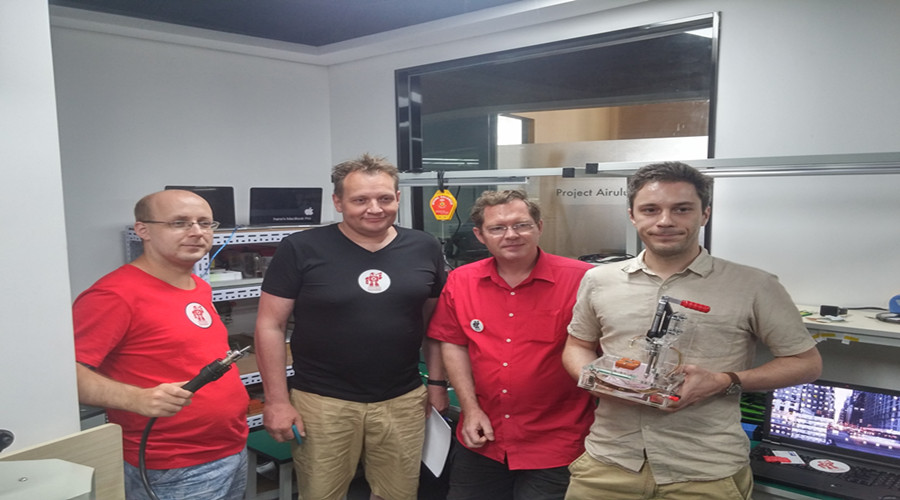4 Expats Initiate Open Source Platform
Writer: | Editor: Vince Xie | From: | Updated: 2016-07-15

(Zeng Ruijia)
An opening ceremony for Troublemaker, an open source platform and accelerator, was held at Huaqiangbei International Maker Space in Hua-qiang Square, Futian District, on Saturday. About 100 people, mainly local expats, were invited to celebrate and join in a hardware workshop.
The four founders of Troublemaker — Robert Mevatne, Nicolas Deladerriere, Hans Stam and Henk Werner, who specialize in different fields such as engineering, electronics, finance and design — initiated the maker community to share ideas and incubate their projects. "We have professional experts and consultants who can give suggestions and guidance to makers to make full use of resources and tools at the maker space and fabrication laboratory. All of us have over 10 years of work experience so we know how to turn innovative ideas into products," said Mevatne, Norwegian CEO of Troublemaker, who found out that many makers' projects fail to get ahead because of a lack of networking and professional skills. "We help expat makers who just arrived here engage with local companies and find resources and the right factory efficiently," said Stam, communicator for Troublemaker, who promotes maker culture via social media and claims to have connections with both European and Chinese companies.
Andrew Aker, a guest from the United States, said that Troublemaker for him is a home for innovation with its open-source environment. "In the past, I had some great ideas but factories rejected me because I couldn't guarantee the quantity of my products. Now I can ask Troublemaker for help and they will make my dream come true." Aker has worked in Shenzhen for eight years.
When asked about the selection of their base, Deladerriere replied: “Huaqiangbei is one of the largest commercial areas that is famous for electronic products and components,and Shenzhen is a creative city close to Hong Kong, Guangzhou and Dongguan." eladerriere has developed products for foreign companies in Shenzhen for 10 years.
An increasing number of maker spaces and startup groups settle in Huaqiangbei, which enables Shenzhen to takes steps closer to becoming the Chinese Silicon Valley. Shenzhen Huaqiang Holdings set up a maker space of about 5,000 square meters last year on the seventh floor of its own office building, charging tenants 1,200 yuan (US$179) per desk. We have secured about 40 teams of tenants so far, with an occupancy rate of about 90 percent. Although the incubator has managed to break even, I am confident that bigger profits will come from the company's investing in some startups in the building," said Lin Kai, the space's operations director.
Although the startup failure rate was over 90 percent last year, Mevatne told Shenzhen Daily that being maker is about failure and getting back up, then failing and getting back up again and again until success is achieved. "But Troublemaker can help them reduce the risk of failure."